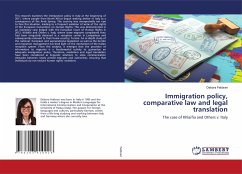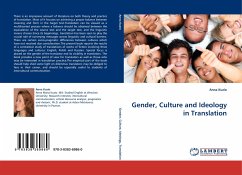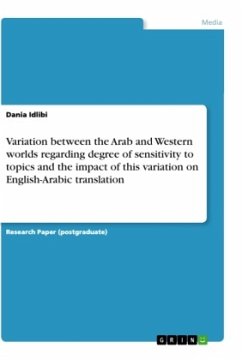
Immigration policy, comparative law and legal translation
The case of Khlaifia and Others v. Italy
Versandkostenfrei!
Versandfertig in 6-10 Tagen
41,99 €
inkl. MwSt.

PAYBACK Punkte
21 °P sammeln!
This research examines the immigration policy in Italy at the beginning of 2011, where people from North Africa began seeking shelter in Italy as a consequence of the Arab Spring. The country was unexpectedly not ripe to face this situation, leading to a frequent violation of some of the rights of the European Convention on Human Rights. This was demonstrated in an exemplary case lodged with the European Court of Human Rights in 2012: Khlaifia and Others v. Italy, where some migrants complained they had been irregularly detained in a reception center in Lampedusa and subsequently removed to th...
This research examines the immigration policy in Italy at the beginning of 2011, where people from North Africa began seeking shelter in Italy as a consequence of the Arab Spring. The country was unexpectedly not ripe to face this situation, leading to a frequent violation of some of the rights of the European Convention on Human Rights. This was demonstrated in an exemplary case lodged with the European Court of Human Rights in 2012: Khlaifia and Others v. Italy, where some migrants complained they had been irregularly detained in a reception center in Lampedusa and subsequently removed to their home country, Tunisia. An in-depth study of the national, European and supranational legislation as well as the border and migration management has shed light on the mechanism of the Italian reception system. From this analysis, it emerges that the provision of information to migrants is a fundamental activity to guarantee an adequate immigration policy. Therefore, mediation and legal translation have been considered as linguistic solutions to solve communication obstacles between newly arrived migrants and authorities, ensuring that individuals do not endure human rights' violations.
This research examines the immigration policy in Italy at the beginning of 2011, where people from North Africa began seeking shelter in Italy as a consequence of the Arab Spring. The country was unexpectedly not ripe to face this situation, leading to a frequent violation of some of the rights of the European Convention on Human Rights. This was demonstrated in an exemplary case lodged with the European Court of Human Rights in 2012: Khlaifia and Others v. Italy, where some migrants complained they had been irregularly detained in a reception center in Lampedusa and subsequently removed to their home country, Tunisia. An in-depth study of the national, European and supranational legislation as well as the border and migration management has shed light on the mechanism of the Italian reception system. From this analysis, it emerges that the provision of information to migrants is a fundamental activity to guarantee an adequate immigration policy. Therefore, mediation and legal translation have been considered as linguistic solutions to solve communication obstacles between newly arrived migrants and authorities, ensuring that individuals do not endure human rights' violations.
This research examines the immigration policy in Italy at the beginning of 2011, where people from North Africa began seeking shelter in Italy as a consequence of the Arab Spring. The country was unexpectedly not ripe to face this situation, leading to a frequent violation of some of the rights of the European Convention on Human Rights. This was demonstrated in an exemplary case lodged with the European Court of Human Rights in 2012: Khlaifia and Others v. Italy, where some migrants complained they had been irregularly detained in a reception center in Lampedusa and subsequently removed to their home country, Tunisia. An in-depth study of the national, European and supranational legislation as well as the border and migration management has shed light on the mechanism of the Italian reception system. From this analysis, it emerges that the provision of information to migrants is a fundamental activity to guarantee an adequate immigration policy. Therefore, mediation and legal translation have been considered as linguistic solutions to solve communication obstacles between newly arrived migrants and authorities, ensuring that individuals do not endure human rights' violations.












